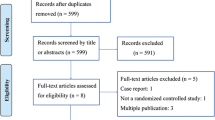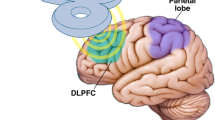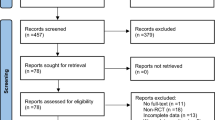Abstract
Objective
Survivors of stroke often experience post-stroke sleep disorders (PSSDs), but pharmacotherapy risks adverse side effects. Transcranial magnetic stimulation (TMS) is potentially a nonpharmacotherapeutic option. This meta-analysis investigated the effects of rTMS to treat PSSD.
Methods
Databases were searched for randomized controlled trials (RCTs) of rTMS to treat PSSD, conducted in accordance with the PRISMA 2020 guidelines. Risk-of-bias assessments were performed using the Cochrane risk-of-bias tool. A meta-analysis of the following indexes was performed using RevMan 5.4 software: Pittsburgh sleep quality index; effective rate of sleep improvement; Hamilton Anxiety Rating Scale (for mood); and National Institute of Health Stroke Scale (NIHSS, stroke severity). Mean differences (MDs) and confidence intervals (CIs) were calculated.
Results
The meta-analysis included 17 RCTs, with 1411 patients overall. The indexes indicated that rTMS could improve the sleep quality, mood, and stroke severity of patients with PSSD: Pittsburgh sleep quality index (12 studies; MD = − 2.51, 95% CI [− 3.24, − 1.79], P < 0.00001); effective rate of sleep improvement (7 studies; MD = 4.03, 95% CI [2.43, 6.68], P < 0.0001); Hamilton Anxiety Rating Scale (2 studies; MD = − 4.05, 95% CI [− 4.77, − 3.32], P < 0.00001); and NIHSS (2 studies; MD = –2.71, 95% CI [− 3.36, − 2.06], P < 0.00001).
Conclusion
The results suggest that rTMS may have positive effects on the sleep quality, mood, and stroke severity of patients with PSSD.








Similar content being viewed by others
References
Owolabi MO, Thrift AG, Martins S et al (2021) The state of stroke services across the globe: Report of World Stroke Organization-World Health Organization surveys. Int J Stroke 16(8):889–901
Sall J, Eapen BC, Tran JE et al (2019) The management of stroke rehabilitation: a synopsis of the 2019 U.S. Department of Veterans Affairs and U.S. Department of Defense Clinical Practice Guideline. Ann Intern Med 171(12):916–924
Lindsay MP et al (2019) World Stroke Organization (WSO): global stroke fact sheet. Int J Stroke 14(8):806–817
Global, regional, and national burden of stroke (2019) 1990–2016: a systematic analysis for the Global Burden of Disease Study. Lancet Neurol 18(5):439–458
Pérez-Carbonell L, Bashir S (2020) Narrative review of sleep and stroke. J Thorac Dis 12(Suppl2):S176–S190
Mountain A et al (2020) Canadian Stroke Best Practice Recommendations: rehabilitation, recovery, and community participation following stroke. Part two: transitions and community participation following stroke. Int J Stroke 15(7):789–806
Zhang Q, Liu Y, Liang Y et al (2021) Exercise intervention for sleep disorders after stroke: a protocol for systematic review and meta-analysis. Medicine 100(17):e25730
Pavlova K, Latreille MV (2019) Sleep disorders. Am J Med 132(3):292–299
Bassetti C, Randerath W, Vignatelli L et al (2020) EAN/ERS/ESO/ESRS statement on the impact of sleep disorders on risk and outcome of stroke. Eur Respir J 55(4):1901104
Iddagoda MT, Inderjeeth CA, Chan K et al (2020) Post-stroke sleep disturbances and rehabilitation outcomes: a prospective cohort study. Intern Med J 50(2):208–213
Wondergem R, Pisters MF, Wouters EJ et al (2017) The course of activities in daily living: who is at risk for decline after first ever stroke? Cerebrovasc Dis 43:1–8
Yu S, Arima H, Bertmar C et al (2016) Depression but not anxiety predicts recurrent cerebrovascular events. Acta Neurol Scand 134:29–34
Yuan J, Wang H, Chen J et al (2020) Effect of low frequency repetitive magnetic stimulation at Shenmen (HT7) on sleep quality in patients with chronic insomnia. Medicine(Baltimore) 99(30):e21292
Auger RR, Burgess HJ, Emens JS et al (2015) Clinical practice guideline for the treatment of intrinsic circadian rhythm sleep-wake disorders: advanced sleep-wake phase disorder (ASWPD), delayed sleep-wake phase disorder (DSWPD), non-24-hour sleep-wake rhythm disorder (N24SWD), and irregular sleep-wake rhythm disorder (ISWRD). An update for, et al (2015) an American Academy of Sleep Medicine Clinical Practice Guideline. J Clin Sleep Med 11(10):1199–236
Jiang B, He D, Guo Z et al (2019) Efficacy and placebo response of repetitive transcranial magnetic stimulation for primary insomnia. Sleep Med 63:9–13
Herrero BA, De Beaumont L, Lavigne GJ (2018) Transcranial magnetic stimulation: potential use in obstructive sleep apnea and sleep bruxism. Sleep Med Clin 13(4):571–582
Lanza G (2020) Repetitive TMS for sleep disorders: are we ready? Sleep Med 71:111–112
Higgins JPT, Green S (2011) Cochrane Handbook for Systematic Reviews of Interventions Version 5.1.0
Tammasse J, Akbar M et al (2021) The influence of repetitive transcranial magnetic stimulation toward improvement of post ischemic stroke patient’s quality of sleep. Med Clín Práct 4(S1):100203
Qian Y, Ma F, Wang J (2021) Clinical effect and impact on polysomnography parameters of Bailemian capsule combined with repetitive transcranial magnetic stimulation on insomnia secondary to ischemic stroke. Chin J Clin Rational Drug Use 14(15):28–30+34
Lingshu W, Zhang Yu, Shuang L et al (2021) A randomized controlled study on acupuncture combined with low frequency repetitive transcranial magnetic stimulation in the treatment of insomnia after stroke. Mod J Integr Tradit Chin West Med 30(06):616–620
Qiaojuan Z, Shirui G, Huiling X (2021) Effect of repetitive transcranial magnetic stimulation combined with diazepam on patients with post-stroke insomnia. Med J Chin People’s Health 33(18):22–24
Ding l, Xiao B, Chen X et al (2020) Effects of repetitive transcranial magnetic stimulation on sleep structure and brain-derived neurotrophic factors in patients with post-stroke sleep disorders. J Pract Med Tech 27(02):153–156
Hua Q, Xia W, Guo F et al (2020) Clinical study of repetitive transcranial magnetic stimulation combined with dexzopiclone tablets in treatment of sleep disorder in cerebral infarction patients. Neural Inj Funct Reconstr 15(05):267–270+295
Wei S, Xue Y, Ling L et al (2019) Efficacy of TMS combined with music electro -acupuncture in treating post-stroke sleep disorders: a clinical observation by polysomnography. J Clin Acupunct Moxibustion 35(04):7–12
Li C (2019) Clinical effect of transcranial magnetic stimulation combined with clonazepam on patients with post-stroke sleep disorders. Pract Clin Med 20(11):14–15+65
Sheng W, Lyu L, Yang X et al (2019) Effect of transcranial magnetic stimulation combined with ear pressure on patients with post-stroke sleep disorders. Med Diet Health (3):77, 79
Chang X (2018) The clinical study of transcranial magnetic stimulation for the therapeutic effect of sleep disorder. Jinan University
Zhu M (2018) Clinical study of infra-low frequency transcranial magnetic stimulation in the treatment of insomnia after ischemic stroke. Nanjing Medical University
Lili D, Lihong Ma, Jianling W et al (2018) Clinical observation on five elements music and low-frequency repetitive transcranial magnetic stimulation for post-stroke sleep disorders. Chin J Integr Med Cardio-Cerebrovasc Dis 16(11):1494–1496
Xu D, Tian J, Chen C et al (2021) Effect of low-frequency repetitive transcranial magnetic stimulation on insomnia after stroke. Chin J Neuroimmunol Neurol 28(01):58–60+66
Peng C, Zhikang C, Mingfen Li et al (2018) Clinical study of repeated transcranial magnetic stimulation on insomnia after stroke. J Hubei Univ Med 37(03):262–264
Zhengmei L (2017) Clinical study on transcranial magnetic stimulation in treatment of insomnia after stroke. Shenzhen J Integr Tradit Chin West Med 27(06):11–13
Hailong L, Wang C, Gu J (2016) Curative observation of transcranial magnetic stimulation in insomnia in patients after stroke. Chin J Neuromed 15(04):403–405
Chunmei W, Luo H, Gu J (2016) Effect of transcranial magnetic stimulation on insomnia after stroke. Mod Med J China 18(05):51–52
Jean-Pascal L, Nathalie A-O, Andrea A et al (2014) Evidence-based guidelines on the therapeutic use of repetitive transcranial magnetic stimulation (rTMS). Clin Neurophysiol 125:2150–2206
Bassetti CLA (2019) Sleep and stroke: a bidirectional relationship with clinical implications. Sleep Med Rev 45:127–128
Gottlieb E et al (2019) The bidirectional impact of sleep and circadian rhythm dysfunction in human ischaemic stroke: a systematic review. Sleep Med Rev 45:54–69
Park D-I, Choi-Kwon S (2018) Poststroke sleep disorders: an executive summary. J Neurosci Nurs 50(50):314–317
Falck RS et al (2019) Sleep and cognitive function in chronic stroke: a comparative cross-sectional study. Sleep 42(5):zsz040
Lefaucheur JP (2019) Transcranial magnetic stimulation. Handb Clin Neurol 160:559–580
Deuschle M, Schredl M, Wisch C et al (2018) Serum brain-derived neurotrophic factor (BDNF) in sleep-disordered patients: relation to sleep stage N3 and rapid eye movement (REM) sleep across diagnostic entities. J Sleep Res 27(1):73–77
Luo J, Zheng H, Zhang L et al (2017) High-frequency repetitive transcranial magnetic stimulation (rTMS) improves functional recovery by enhancing neurogenesis and activating BDNF/TrkB signaling in ischemic rats. Int J Mol Sci 18:455
Shao D, Zhao ZN, Zhang YQ et al (2021) Efficacy of repetitive transcranial magnetic stimulation for post-stroke depression: a systematic review and meta-analysis of randomized clinical trials. Braz J Med Biol Res 54(3):e10010
Byun E, Kohen R, Becker KJ et al (2020) Stroke impact symptoms are associated with sleep-related impairment. Heart Lung 49:117–122
Cao B, Passos IC, Mwangi B et al (2017) Hippocampal subfield volumes in mood disorders. Mol Psychiatry 22:1352–1358
Piotr G, Monika T (2018) Neurodevelopmental theory of depression. Prog Neuropsychopharmacol Biol Psychiatry 80:267–272
Herrmann MJ, Katzorke A, Busch YM et al (2017) Medial prefrontal cortex stimulation accelerates therapy response of exposure therapy in acrophobia. Brain Stimul 10:291–297
Guoxiang F, Ying W (2018) Effects of rTMS on hippocampal endocannabinoids and depressive-like behaviors in adolescent rats. Neurochem Res 43:1756–1765
Katzan IL, Thompson NR, Walia HK et al (2020) Sleep disturbance predicts future health status after stroke. J Clin Sleep Med 16:1863–1870
Raven F, Van der Zee EA, Meerlo P et al (2018) The role of sleep in regulating structural plasticity and synaptic strength: implications for memory and cognitive function. Sleep Med Rev 39:3–11
Konjarski M, Murray G, Lee VV et al (2018) Reciprocal relationships between daily sleep and mood: A systematic review of naturalistic prospective studies. Sleep Med Rev 42:47–58
Jean-Pascal L, André A, Chris B et al (2020) Evidence-based guidelines on the therapeutic use of repetitive transcranial magnetic stimulation (rTMS): An update (2014–2018). Clin Neurophysiol 131:474–528
Philipp R, Matthias H, Stephan B et al (2019) Modulating functional connectivity between medial frontopolar cortex and amygdala by inhibitory and excitatory transcranial magnetic stimulation. Hum Brain Mapp 40:4301–4315
Burke MJ, Fried PJ, Pascual-Leone A (2019) Transcranial magnetic stimulation: neurophysiological and clinical applications. Handb Clin Neurol 163:73–92
Funding
The authors disclose the receipt of the following financial support for the research, authorship, and/or publication of this article: Supported by Natural Science Foundation of Fujian Province, China (Grant No. 2021J01946).
Author information
Authors and Affiliations
Contributions
Conceived the idea: Jiaying Guo and Fang Liu; collected data: Jiaying Guo, Fang Liu, and Xin Chen; analyzed and interpreted data: Jiaying Guo, Fang Liu, Shaohong Lin, and Xin Chen; wrote the first draft: Jiaying Guo, Fang Liu, and Zecai Lyu; key revisions to important contents of the manuscript: Jiaying Guo, Fang Liu and Huoqin Xiu; conducted meta-analyses: Jiaying Guo, Fang Liu, and Zecai Lyu; and study supervision: Jiaying Guo and Fang Liu, who contributed equally to this study.
Corresponding author
Ethics declarations
Conflict of interest
The authors declare no competing interests.
Ethical approval
None.
Informed consent
None.
Statement of human and animal rights
This article does not contain any studies with animals performed by any of the authors.
Additional information
Publisher's note
Springer Nature remains neutral with regard to jurisdictional claims in published maps and institutional affiliations.
Jiaying Guo and Fang Liu are common first authors.
Supplementary Information
Below is the link to the electronic supplementary material.
ESM 1
(DOCX 78.0 KB)
Rights and permissions
Springer Nature or its licensor holds exclusive rights to this article under a publishing agreement with the author(s) or other rightsholder(s); author self-archiving of the accepted manuscript version of this article is solely governed by the terms of such publishing agreement and applicable law.
About this article
Cite this article
Guo, J., Chen, X., Lyu, Z. et al. Repetitive transcranial magnetic stimulation (rTMS) for post-stroke sleep disorders: a systematic review of randomized controlled trials. Neurol Sci 43, 6783–6794 (2022). https://doi.org/10.1007/s10072-022-06349-5
Received:
Accepted:
Published:
Issue Date:
DOI: https://doi.org/10.1007/s10072-022-06349-5




